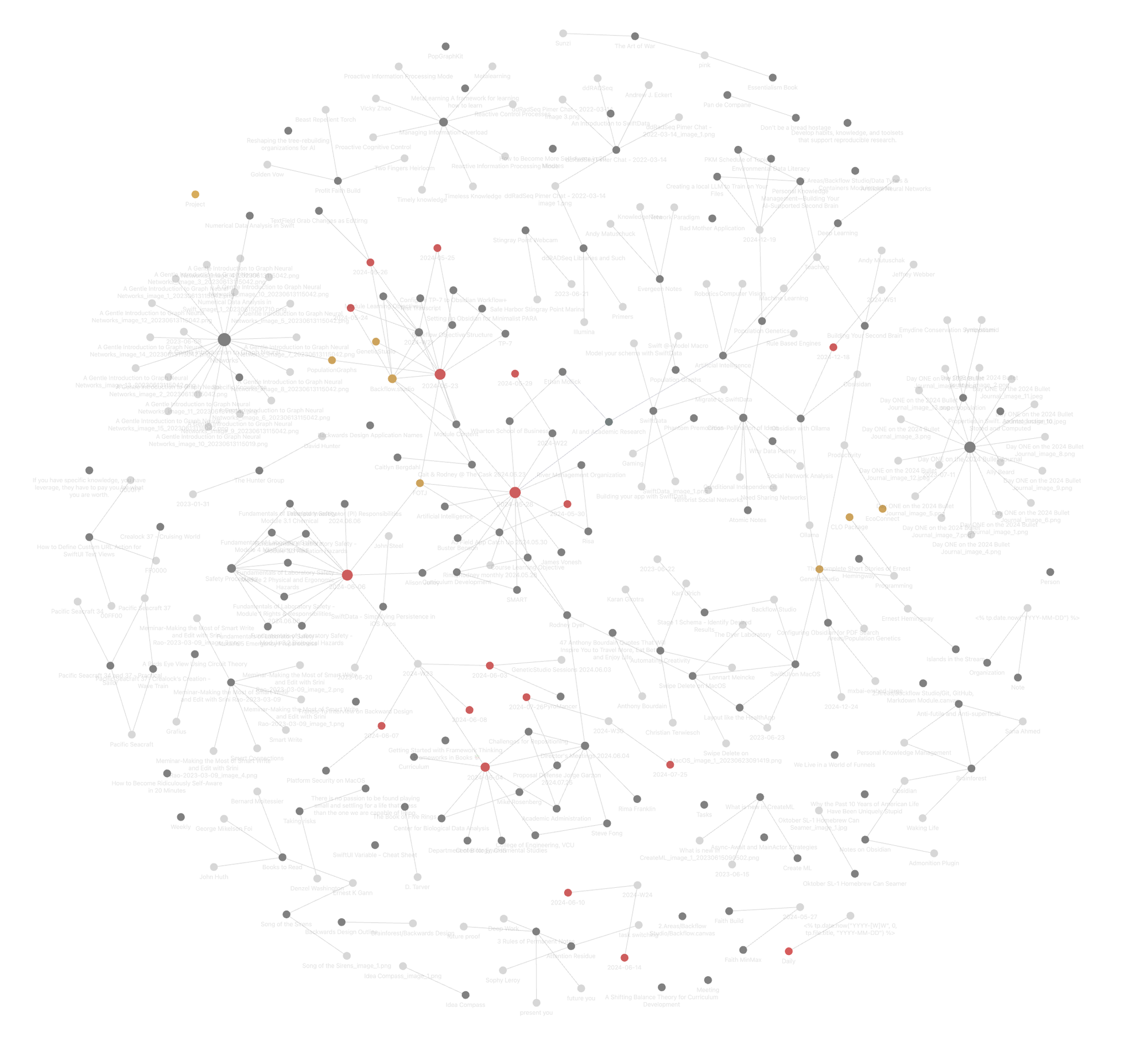Personal Knowledge Management: Building Your AI-Supported Second Brain
This course introduces participants to personalized knowledge management systems that enhance the collection, organization, and retrieval of academic and professional information.

This course introduces participants to personalized knowledge management systems that enhance academic and professional information collection, organization, and retrieval. It guides students through the use of contemporary artificial intelligence tools and strategies to help maintain a 'second brain,' fostering improved productivity and decision-making. The course is graded as pass/fail.
In today's fast-paced digital world, managing personal knowledge effectively is more crucial than ever for undergraduate and graduate university students. This course offers a transformative approach to learning, equipping students with the skills to develop a personalized knowledge management (PKM) system and harness AI tools' power in organizing, synthesizing, and applying that repository of information for academic, professional, and personal growth.
This course empowers students to create personalized knowledge systems that enhance their academic performance, foster innovative thinking, and prepare them for the complexities of the modern professional landscape. By mastering the art of personal knowledge management, students will improve their ability to retain and utilize information—gaining a competitive edge in their future careers—where the ability to adapt and manage information is paramount.
Course Learning Outcomes
By the end of this collaborative experience, participants will be able to:
- Analyze and explain the concept of Personal Knowledge Management (PKM): Students will analyze the principles, importance, and benefits of managing personal knowledge effectively and articulate their understanding in academic and individual contexts.
- Design and Implement a Personal Knowledge System ("Second Brain”): Students will conceptualize, design, and refine their personalized knowledge management system to systematically accumulate, organize, and retrieve knowledge across multiple domains.
- Leverage Artificial Intelligence (AI) Tools to Enhance Knowledge Management: Students will identify, evaluate, and apply AI tools to augment their personalized knowledge systems, enhancing the processes of knowledge capture, organization, and retrieval.
Course Logistics
Hello. My name is Dr. Rodney Dyer. I've been a professor at VCU since 2004. I am a data nerd, botanist, award-winning beer brewer, programmer from before personal computers had hard drives, and a self-proclaimed connoisseur of artificial intelligence approaches to knowledge and data management.
I am so excited about the content of this course that, in addition to teaching it this semester, I will apply the same techniques and go through the same processes as you to refine my own "Second Brain." Last semester, I did a "dry run" with a new "graphical" note-taking system (image below) and learned quite a bit about what works best for me and my needs.

I'll work under another paradigm this semester and further explore PKM and AI advances alongside you. The main goal of this course is to help you better manage the increasing amounts of information we are given and to make it work for you.
Content Schedule
Content and assessments have defined deployment and due dates. Topics are ordinated and must proceed in a specific sequence. They are presented in the Course Summary Table below.
Assessments for this class are based on:
- Topic Quizzes: These are a few brief Canvas online quizzes associated with the presented content. They are worth 5 points each.
- Homework: This course consists of nine learning modules, each of which will be assessed for 20-25 points. Modules with topic quizzes will be worth 20 points, while those without them will be worth 25 points.
- Final Presentation: At the end of the course, you will deliver a final presentation on your "Second Brain." This presentation will be recorded and distributed as a video worth 75 points.
Defined rubrics will guide the grading of homework and final presentations. Much of the work in this course will be reflective. Rather than regurgitating facts and information for assessments, I am here to help you develop an effective knowledge management practice. As a result, this course would be best delivered as a Pass/Fail course. Your final grade will be determined by the percentage of total points you achieved. If you gain 70% or more of the available points, you will be assigned a grade of Pass. If not, you will receive a Fail.
There is no extra credit and no "makeup" for missed assignments. Excused medical conditions or other pre-arranged events are possible—please speak with me early. I give more than a week to complete each assignment, which is plenty of time to finish the required content.
Topics
- Pre-Class Logistics
- PKM Self-Audit
- Note Taking Archetypes
- Flow Mapping
- Toolfinder Database
- The Impossible Problem
- Tools & Frameworks for PKM & AI Integration
- Training Personal AI Models
- Reflect, Refactor, & Refine
- Finals Summary or "Hey AI Helped Me Succeed!"
- My Second Brain Presentations
Communication
As this is an online asynchronous course, communication is essential—in both directions:
- Course content will be deployed from this Canvas site.
- I will be available for virtual office hours on Zoom. Wednesday from 1:00 - 2:30 pm.
- I am also more than happy to arrange additional times to chat in person, via Zoom, or by prior arrangement. Please DO NOT WAIT to contact me. A significant part of my job is helping students succeed, so please don't hesitate to come and chat with me. When my office door is open, feel free to pop in.
- Please use your VCU email for all communications with me.
- Canvas also has a built-in discussion board and email facilities. Posting to the discussion board for general inquiries helps others with similar questions.
VCU Syllabus Statement
Students should visit http://go.vcu.edu/syllabusLinks to an external site. and review the full university syllabus statement, which includes information on safety, registration, the VCU Honor Code, student conduct, withdrawal, and more.
